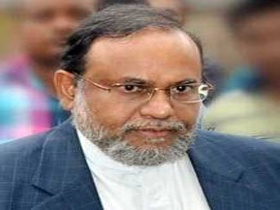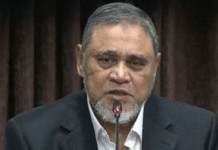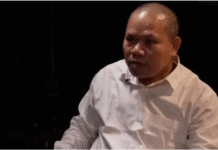After organising an outfit named Al Badr, a vigilante group of Jamaat-e-Islami during the 1971 Liberation War, accused Mir Quasem Ali had appeared as its head in Chittagong.
Nasir Uddin Chowdhury, a freedom fighter prosecution witness, also a victim of persecution by Al Badr in captivity during the 1971 Liberation War, on Sunday stated this before International Crimes Tribunal-2 while testifying as PW-3.
“During my captivity, I came to know about the information from the discussions among the members of Al Badr headquartered at occupied Dalim Hotel,” said Nasir Chowdhury, adding that there were two more makeshift Al Badr camps -– one at Dewanhat Hotel (now non-existent) and another at tannery godown in Chaktai area.
He said: “I had also heard from their discussions that the members of Al Badr used to kill captured freedom-loving people and later dumped the bodies into the river Karnaphuli after torturing them in captivity at the makeshift camps at the behest of Quasem Ali.”
PW-3 Nasir Chowdhury, also a journalist by profession, told the tribunal that at end-November he had been captured by the members of Al Badr following a raid at Mohaddes Villa in Andakilla where took refuge in mid-October 1971.
He said that Al Badr picked him up as he was sleeping and took him blindfolded to Dalim Hotel, beating him on the way.
“During my captivity, sometimes Mir Quasem Ali also used to interrogate me with torture for divulging information about arms and location of freedom fighters. But despite torture I didn’t disclose anything.” said Nasir Chowdhury.
He told the three-member tribunal headed by Justice Obaidul Hassan that local people from Hajari Gali rescued him from captivity after breaking open the door of Dalim Hotel on December 16, 1971 — the day Bangladesh was liberated from Pakistan occupation forces.
Before concluding his deposition, PW-3 Nasir Uddin Chowdhury identified detained Mir Quasem Ali, now a policymaker of Jamaat-e-Islami, in the dock.
The PW-3 will be cross-examined on Monday.
On May 26 last year, the tribunal took cognisance of the charges made against Quasem Ali, also chairman of private television channel Diganta (operation now suspended), as it found a strong prima facie case against the accused under subsections 3(2), 4(1) and 4(2) of the International Crimes (Tribunals) Act 1973.
Quasem Ali, the then Chittagong district head of Al Badr, a vigilante group of Jamaat-e-Islami, faces 14 counts of charges of crimes against humanity during the 1971 Liberation War.
The charge ‘extortion’ has been included for the first time by the prosecution marking it as crimes against humanity under subsection 3 (2) (a) of the International Crimes (Tribunals) Act 1973.
According to the prosecution, Quasem Ali, also a 1971 front-ranking leader of Islami Chhatra Sangha (ICS), had perpetrated various crimes against humanity like killing, looting, abduction, persecution, genocide, rape, extortion, and setting fire to the houses of unarmed civilians during the Liberation War in collaboration with Pakistan occupation army.
On June 17, 2012, plainclothes police arrested Jamaat leader Quasem Ali from the office of the vernacular daily Nayadiganta in the capital hours after the tribunal issued a warrant for his arrest on charges of his alleged crimes against humanity during the 1971 Liberation War.
Source: UNBConnect










